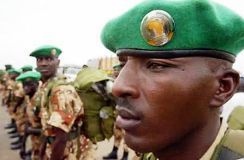INTERVIEW- Sudan agrees to extend mandate of Darfur monitors
By Opheera McDoom
KHARTOUM, Sept 9 (Reuters) – Sudan will agree to expanding the mandate of African Union (AU) monitors in its Darfur region to allow them to document human rights abuses, Justice Minister Ali Mohamed Osman Yassin said on Thursday.
 The 53-nation AU has more than 80 observers in Darfur, but only to observe a ceasefire between the government and rebels who launched an uprising in February 2003. Some 300 AU troops have been deployed to protect the monitors.
The 53-nation AU has more than 80 observers in Darfur, but only to observe a ceasefire between the government and rebels who launched an uprising in February 2003. Some 300 AU troops have been deployed to protect the monitors.
A draft Security Council resolution circulated by the United States on Wednesday called for more AU monitors in the vast western region and said they should be empowered to investigate all abuses.
Washington and aid agencies accuse Arab militias, known as Janjaweed, of killing, raping and forcing African villagers in Darfur from their homes, in what the United Nations says is the world’s worst humanitarian crisis.
Sudan has said it would accept more AU monitors but not if their mandate was expanded to include a peacekeeping role.
“We don’t feel (there is) a problem of allowing or giving permission to new monitors to come and intensify their work over there because that would help us a lot,” Yassin told Reuters in an interview. “We consider monitors as partners in helping us in the solution rather than supervisors or observers.”
When asked specifically if Sudan would allow AU observers to document human rights abuses, Yassin said: “We don’t mind that, of course we don’t.”
Yassin was speaking before U.S. Secretary of State Colin Powell said the Darfur violence — which the United Nations estimates has displaced more than a million people and directly or indirectly killed up to 50,000 — constituted genocide.
The U.S. draft resolution in the Security Council threatens sanctions on the budding oil-producer if it does not stop the abuses and accept a larger AU monitoring force.
Sudan tacitly agreed to allow human rights observers into Darfur in a joint U.N.-Sudanese communique in July.
Yassin said imposing sanctions on Sudan would be unfair, reiterating his government’s position that it has cooperated fully with the United Nations.
“That would be a very unfair decision. It would stop all life in the country and would make our financial situation very difficult,” he said.
U.N. Secretary-General Kofi Annan, who has also called for a larger monitoring force, has said Khartoum needs to do much more to protect civilians.
The United Nations has suggested deploying at least 3,000 troops and observers along with about 1,000 police.
After years of low-level conflict between Arab nomads and African farmers over scarce resources in arid Darfur, rebels took up arms accusing Khartoum of supporting Janjaweed to loot and burn African villages in a campaign of ethnic cleansing.
Khartoum denies the charge and calls the Janjaweed outlaws.
AD HOC AMNESTY
Yassin said there was an ad hoc amnesty in Darfur to try to encourage armed men to lay down their arms, and more than 100 men had been pardoned.
“We want to disarm everybody. So that is really encouragement to those who are making more trouble over there,” he said, adding that criminals would not be pardoned.
He said it should also be an incentive to the rebels. When asked if they would also be pardoned, he said: “I guess so. Always the president is merciful. He encourages pardons,” he said. Many rebels from the south were pardoned, he added.
Yassin declined to say exactly how many Janjaweed had been arrested or prosecuted so far in Darfur, because many had not yet been convicted and some of those who had been convicted were appealing.
But he said the term Janjaweed, which is loosely derived from the Arabic for “devils on horseback”, was being misunderstood internationally.
“Not everyone riding on a horse is Janjaweed because horses and camels are a means of transport over there. This is unfortunately a misconception about the Janjaweed,” he said.
Yassin added the government was targeting criminals and investigating claims of rape. Rights groups have said rape has been used as a systematic weapon in Darfur.
